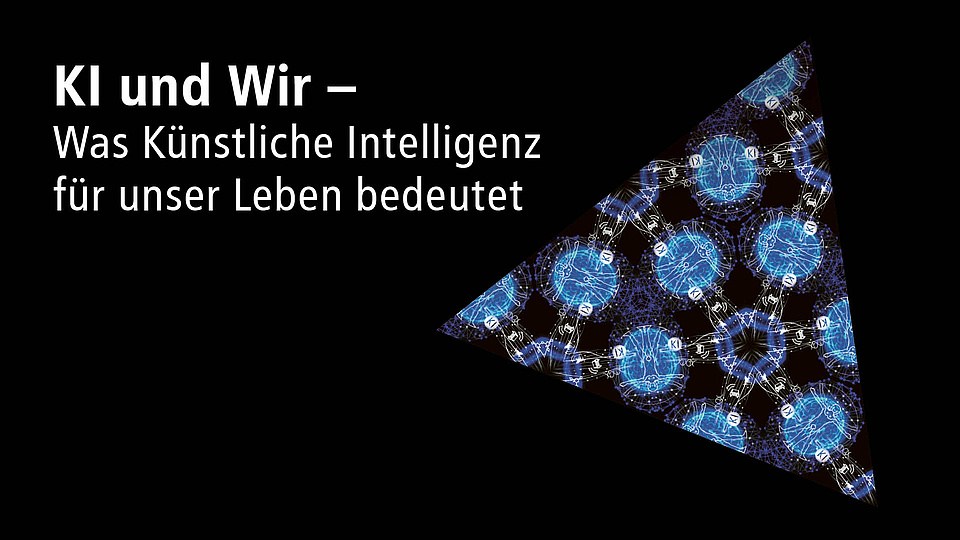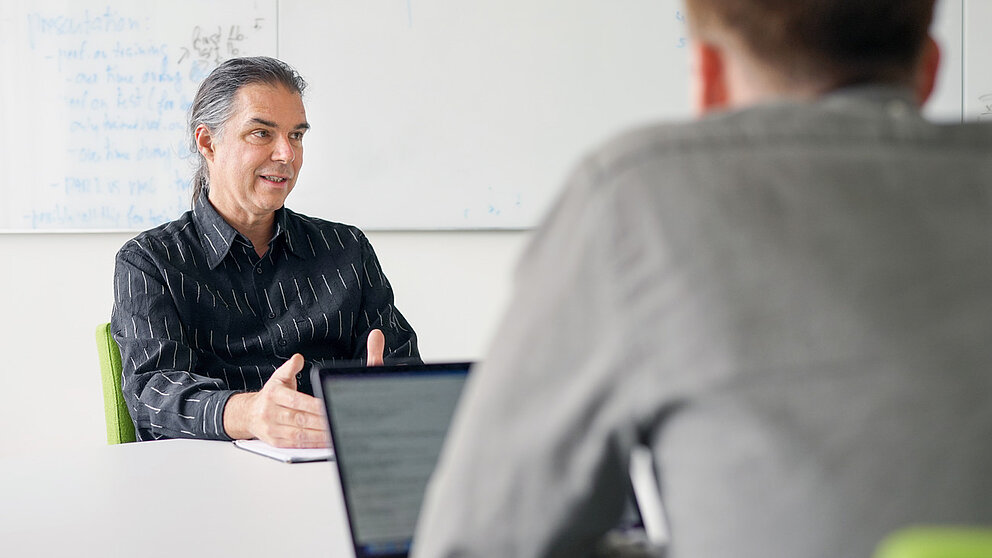Jump to the content
- {{#headlines}}
- {{title}} {{/headlines}}

HOLGER HOOS
Professor Dr Holger Hoos is a computer scientist and, as of 2022, Humboldt Professor for AI at RWTH Aachen University. He previously conducted research in Canada and the Netherlands.
KOSMOS: Professor Hoos, you campaign for human-centred AI. What does that mean exactly?
HOLGER HOOS: AI should help us humans solve problems that we can’t manage to solve without AI. In medicine, there are many applications where this is the case. And when it comes to climate change, we are also dependent on AI to understand the atmosphere and the oceans better. But the ethical foundations of AI are also very important. We must ensure that using AI does not lead to a loss of privacy or the construction of lethal autonomous weapon systems. In short, I’m interested in AI for the benefit of people, which also means making AI itself more sustainable.
How do you want to go about it? Data centres already account for a good deal of CO₂ emissions. And the trend is upwards ...
Exactly. My research also looks at how we can make machine learning more efficient: achieve similarly good results using less data and fewer calculations to lower CO₂ emissions. Our goal is to make savings of between 50 and 90 percent. This would also cut down on the hardware required and thus reduce the number of resources consumed in manufacturing semiconductors.
You do basic research, but your results are also used in business. How does that collaboration work?
We develop basic methods. And, in AI, they are often tested using very realistic data, for example from business. The resulting software is usually published open source, not least for the sake of scientific reproducibility but also to make it easier for others to build on it. So, industry can apply our results really quickly.
Do you get research funding from industry?
Sometimes, yes. But for us, cooperation is less about money and more about observing how our methods stand up when faced with solving real-world application problems. Apart from which, I have the generous endowment that comes with the Alexander von Humboldt Professorship. The problem at the moment is not that we don’t have enough money, but that we have to recruit people with the necessary talent for research. And the market is already pretty tight.
Because you compete with industry?
It does happen that doctoral students from my group go on to work in industry. There is simply a lot of interest in our topics and in well-trained experts. Of course, I’m pleased when my former staff and students get opportunities like that. On the other hand, it is problematic when our top talents find working conditions in industry that are much more attractive than anything we can offer at universities.
What are the consequences?
Of course, it’s great when cutting-edge research is done by industry, too. But if the main focus is there, we have a problem, because in business, of course, special attention is always directed to short-term results. The role of universities, on the other hand, is to look more to the long-term and take far greater account of what is socially relevant. This is also one of the reasons why I and others like me enjoy being at universities, even if the general conditions in industry are tempting, not to mention the salary.
In what way?
The availability of large amounts of good data, for example, or big computing capacities. If you work at Google or DeepMind, for instance, you are also surrounded by a load of other really good people in your own field. Of course, this is true in a research group like mine at university, too, but on a completely different scale. Then again, what makes university research so attractive to many is the focus on solutions for the common good, such as human-centred AI.
Europe and the German government also support this approach. In terms of international competition, could this become a hallmark of AI development in Germany and Europe, and a locational advantage?
There are also important centres in the United States that are now committed to human-centred AI. But I think there is a critical mass here in Europe and major commitment to this direction. And that is pretty unique in the world.
Location pessimists say that Europe has long been left behind by the AI industry in the United States and China ...
There are also positive examples, such as the translation software DeepL. But in general, Europe isn’t doing enough to realise the ambitions formulated by the European Commission, for example. There is a huge gap. And that’s why I invest a considerable portion of my energy in creating awareness and coming up with ideas on how we can deal with this unsatisfactory state of affairs.
AI is the key to the next generation of science. If we fall behind now, we’ll get left behind.
What do you suggest?
I’ve spent 20 years of my scientific career in Canada. There, they have managed to become an AI superpower with relatively modest investment. And they’ve done it by channelling a large share of their investment into basic research and universities, deliberately not into industry. In AI, basic research is often so close to viable applications that industry is automatically attracted to it. I think German policy makers should take this on board more. It would also be excellent if other European countries had something like the Alexander von Humboldt Professorship. And we ought to develop initiatives at European level that attract international attention and hit the headlines, for example in the New York Times or the South China Morning Post.
How do you envisage an initiative like that?
One possibility would be to establish a largescale research facility, a CERN for AI. That would hit the headlines everywhere and attract talent from all over the world. If you want to have global appeal, you need a beacon that is really big and bright.
You are one of the thought leaders in the European AI network CLAIRE (Confederation of Laboratories for Artificial Intelligence Research in Europe). What would be the benefit of a large-scale research facility à la CERN?
Our diversity and our network in many countries are amongst the great locational advantages we have in Europe. We need to expand that. But a network like that also needs a hub where activities are bundled and concentrated. Work at CERN is not restricted to operating a large particle accelerator, it’s also about people exchanging ideas there, which is very important for science. Lots of things are easier and more achievable when people are in close proximity. The pandemic has made this even clearer.
CERN has the large particle accelerator. What infrastructure would the European AI centre need? A giant computer?
Absolutely! We need a whole network of AI computers: a major network hub at European level, then slightly smaller ones in the individual countries and additional capacities at the respective sites. As a Humboldt Professor in Aachen, I am currently investing a million euros in a mainframe computer. For some of the research we do we need our own computers that we can control completely ourselves. But beyond that, we need capacity that our one research group could never afford.
How optimistic are you that even more money will be invested in AI research in Europe?
I believe there’s no alternative. In my view, AI is the key to the next generation of science and thus the driver of progress in many areas. If we fall behind now, we’ll get left behind, both in terms of research and then later, the quality of life of our citizens.


